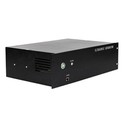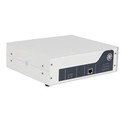Can an ultrasonic filtration system be used in industrial settings?
In the dynamic landscape of industrial operations, the quest for efficient and reliable filtration solutions is a constant pursuit. As a leading supplier of ultrasonic filtration systems, I am frequently asked whether these innovative technologies can be effectively employed in industrial settings. The answer is a resounding yes, and in this blog post, I will delve into the reasons why ultrasonic filtration systems are not only suitable but also highly advantageous for a wide range of industrial applications.
Understanding Ultrasonic Filtration Systems
Before exploring their industrial applicability, it is essential to understand the basic principles behind ultrasonic filtration systems. These systems utilize high - frequency ultrasonic waves to enhance the filtration process. When ultrasonic waves are introduced into a liquid medium, they create cavitation bubbles. These bubbles form, grow, and collapse rapidly, generating intense local forces such as shockwaves and micro - jets. These forces can dislodge particles that are adhered to the filter media, preventing clogging and improving the overall filtration efficiency.
There are two main types of ultrasonic filtration systems that we offer: the Ultrasonic Pipe Filter and the Ultrasonic Tank Filter. The Ultrasonic Pipe Filter is designed to be integrated directly into the pipeline, allowing for continuous filtration of the flowing liquid. On the other hand, the Ultrasonic Tank Filter is suitable for batch - type operations where the liquid is stored in a tank.
Advantages of Ultrasonic Filtration Systems in Industrial Settings
- Enhanced Filtration Efficiency
One of the primary benefits of using ultrasonic filtration systems in industrial settings is the significant improvement in filtration efficiency. In many industrial processes, filter media can become clogged with particles over time, reducing the flow rate and the quality of the filtrate. The ultrasonic cavitation effect helps to keep the filter pores clean, ensuring a consistent flow of liquid through the filter. This not only improves the overall productivity of the filtration process but also reduces the need for frequent filter replacements.
For example, in the chemical industry, where precise filtration of reactants and products is crucial, ultrasonic filtration systems can maintain a high level of filtration performance even when dealing with high - viscosity or particle - laden liquids. This results in higher - quality end - products and more efficient production processes.
- Reduced Maintenance Costs
Industrial operations often incur substantial costs associated with filter maintenance and replacement. Traditional filtration systems may require frequent cleaning or replacement of filter elements, which can be time - consuming and expensive. Ultrasonic filtration systems, however, significantly reduce these maintenance requirements. By preventing clogging and extending the lifespan of the filter media, the need for manual cleaning and replacement is minimized. This translates into lower maintenance costs and less downtime for the industrial facility.
In the food and beverage industry, where strict hygiene standards must be met, ultrasonic filtration systems can operate for longer periods without the need for extensive cleaning. This reduces the risk of contamination and ensures a more continuous and cost - effective production process.
- Versatility
Ultrasonic filtration systems are highly versatile and can be adapted to a variety of industrial applications. They can be used to filter different types of liquids, including water, oils, chemicals, and biological fluids. Moreover, these systems can handle a wide range of particle sizes, from large debris to fine colloidal particles.
In the pharmaceutical industry, for instance, ultrasonic filtration systems can be used to separate active pharmaceutical ingredients from impurities during the manufacturing process. The ability to customize the ultrasonic frequency and power allows for precise control over the filtration process, ensuring the highest quality of the final product.
- Environmental Friendliness
In today's environmentally conscious world, industrial facilities are increasingly looking for sustainable filtration solutions. Ultrasonic filtration systems offer several environmental benefits. By reducing the need for filter replacements, less waste is generated. Additionally, the energy consumption of ultrasonic filtration systems is relatively low compared to some traditional filtration methods, making them a more energy - efficient option.
In the wastewater treatment industry, ultrasonic filtration systems can be used to remove pollutants from industrial effluents. This not only helps to meet environmental regulations but also allows for the reuse of treated water, conserving valuable water resources.
Case Studies
To further illustrate the effectiveness of ultrasonic filtration systems in industrial settings, let's look at a few case studies.
Case Study 1: Automotive Manufacturing
An automotive manufacturing plant was facing challenges with the filtration of cutting fluids used in their machining processes. The traditional filtration system was unable to effectively remove fine metal particles, leading to clogging and reduced tool life. After installing an ultrasonic pipe filter, the filtration efficiency improved significantly. The ultrasonic waves dislodged the metal particles from the filter media, preventing clogging and maintaining a consistent flow of cutting fluid. This resulted in longer tool life, reduced downtime for filter maintenance, and improved overall productivity.
Case Study 2: Mining Industry
In a mining operation, the filtration of slurry was a critical step in the ore processing. The high - solids content of the slurry made it difficult for the traditional filtration system to operate efficiently. By implementing an ultrasonic tank filter, the mining company was able to improve the separation of solids from the slurry. The ultrasonic cavitation effect helped to break up agglomerates and enhance the settling of solids, resulting in a clearer filtrate and more efficient processing.
Challenges and Considerations
While ultrasonic filtration systems offer numerous advantages, there are also some challenges and considerations that need to be addressed when using them in industrial settings.


-
Initial Investment
The initial cost of installing an ultrasonic filtration system can be higher compared to traditional filtration systems. However, it is important to consider the long - term benefits, such as reduced maintenance costs and improved productivity, which can offset the initial investment over time. -
System Design and Integration
Proper system design and integration are crucial for the successful operation of ultrasonic filtration systems in industrial settings. Factors such as the type of liquid, flow rate, particle size distribution, and operating conditions need to be carefully considered when selecting and installing the system. It is recommended to work with an experienced supplier who can provide customized solutions based on the specific requirements of the industrial application. -
Compatibility with Existing Equipment
When integrating an ultrasonic filtration system into an existing industrial process, compatibility with other equipment needs to be ensured. For example, the ultrasonic waves should not interfere with the operation of other sensitive instruments or machinery in the facility.
Conclusion
In conclusion, ultrasonic filtration systems are highly suitable for industrial settings. Their ability to enhance filtration efficiency, reduce maintenance costs, offer versatility, and provide environmental benefits make them an attractive option for a wide range of industrial applications. While there are some challenges and considerations, these can be effectively managed with proper planning and the expertise of a reliable supplier.
If you are an industrial operator looking for a more efficient and reliable filtration solution, I encourage you to explore the possibilities of ultrasonic filtration systems. Our team of experts is ready to assist you in selecting the right system for your specific needs and to provide support throughout the installation and operation process. Contact us today to start a discussion about how our ultrasonic filtration systems can improve your industrial processes.
References
- "Ultrasonic - assisted filtration: A review of the current state - of - the - art" by M. A. Gonzalez - Garcia et al., Ultrasonics Sonochemistry, 2018.
- "Advances in ultrasonic filtration technology for industrial applications" by R. Smith, Journal of Industrial Filtration, 2020.
- "Case studies in industrial ultrasonic filtration" by P. Johnson, Industrial Process Engineering, 2021.





